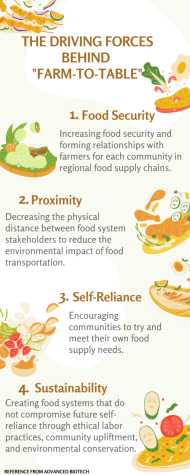Op-Ed: Farm-to-table
April 13, 2023
Every single morning, the Mcdonald’s drive-through line in my neighborhood is around 20 cars long. Upon my arrival at school, I see so many Starbucks cups they’re practically part of the school uniform. Fast-forward to lunch, where those without time to eat a servery meal grab chips and a cookie. At 3 p.m., Starbucks gets its second rush of teenagers, and on the bus ride home, flashy Chick-fil-A meals and Subway sandwiches appear all over Los Angeles.
America’s capitalism monetizes and manipulates a life essential: food. Ultra-processed foods contain added chemicals and preservatives from manufacturing, ranging from Wendy’s and Sprite to protein bars and instant ramen. These foods are faster, cheaper and imperishable — essentially a gold rush for companies’ mass production. Advertisers profit off our cravings. Mcdonald’s billboards appear right when you’re hungry, restaurants offer children’s collectibles and the cheese pizza in that commercial looks uncharacteristically heavenly. As a Gen-Zer, I’ve never lived in a time not dominated by this food culture.
What does this food do to your body? Its fewer nutrients contribute to low energy and malnourishment. In the long run, an unhealthy amount of fast food increases the risks of obesity, cardiovascular disease, coronary heart disease — the list goes on. I’m sure you’ve heard this before: fast food will change your health. But it doesn’t stop there: it also changes our culture.
Fast food is very American. In the 1950s, when new highways created our on-the-go driving culture, fast food chains assembled a convenient restaurant map aligning with our country’s values: fast, cheap, easy and big. By the 1950s and ’60s, fast food peaked.
In the 1970s, one woman slowed the clocks. After culminating her studies in French culture at Berkeley with a trip to France, Alice Waters returned, enlightened by their farm-to-fork food culture. She pioneered the farm-to-table movement to rebel against our country’s fast food and embarked a goal to change the way America eats.
 The farm-to-table movement prioritizes natural, locally produced foods and slow-cooked meals over ultra-processed fast food. It shuns global food systems in favor of local farming and encourages buying produce directly from growers to support sustainable economies.
The farm-to-table movement prioritizes natural, locally produced foods and slow-cooked meals over ultra-processed fast food. It shuns global food systems in favor of local farming and encourages buying produce directly from growers to support sustainable economies.
Waters opened Chez Panisse in 1971, a restaurant serving a menu that changed daily based on seasonal ingredients, with a network of ethical local suppliers — ranchers, fishers, orchardists, foragers and backyard gardeners. The restaurant grew famous over the decades, so Waters produced cookbooks, a culinary education foundation and sustainable food projects. She also received seven James Beard Awards. Chez Panisse popularized the slow-food movement across America.
Let’s be honest: processed food was created for a reason. It feeds millions more than slow food, accommodates the fast lifestyle, costs $1.50 less per day than healthier options and even provides a connection for small communities. But in the interests of a strong mind, body and soul, we should embrace a balance. Not between “healthy” and “guilty,” a word I despise, but between on-the-go and farm-to-table.
Since before I was born, my family has created this balance. Fresh food keeps you in touch with the seasons: experiencing the first juicy bite of a ripe peach in the summer, a creamy pumpkin soup to spice up autumn, peeling tangy mandarins in December and grilling tender, buttery artichokes in the spring. Waters supports eating produce when it naturally grows, not when chemicals force it to.
My family buys store-bought bread, but we bake homemade sourdough on free weekends. Every morning, we collect eggs from the six chickens in our backyard coop, enjoying cruelty-free eggs and a deposit for extra food waste. Over the years, we’ve switched vegetable oil to coconut oil, Skippy to natural peanut butter and soda for fresh fruit. By avoiding KFC, we discovered the Mediterranean chain Zankou Chicken.
Fresh groceries costing $20 at Smart and Final make a home-cooked dinner for five, as opposed to a $40 family pack of Big Mac meals. Family dinner is a staple at least once a week, providing a cozy place to enjoy a fresh meal and tell the day’s stories over shrinking candles.
Exhausting days still require popping a frozen pizza in the oven, and we stock protein bars in the pantry for running out the door on the way to school. On road trips, I start navigating to In-N-Out as early as 9:45 a.m.; well, partly due to their manipulative advertising. The most important lesson about balance is it has to be attainable, which is why spending hours resisting a box of fries is a senseless habit.
To get started, stop by the farmer’s market this Sunday. It might surprise you.


Allie Yang • Apr 14, 2023 at 8:52 am
Lucy! This op-ed is so powerful. I love how at the bottom you provide actionable solutions supported by confident opinions (I’ll definitely be replacing my processed peanut butter with a natural option now). I also appreciate your differentiation between “healthy” and “guilty” vs. “on-the-go” and “farm-to-table.” Wonderful job, as always